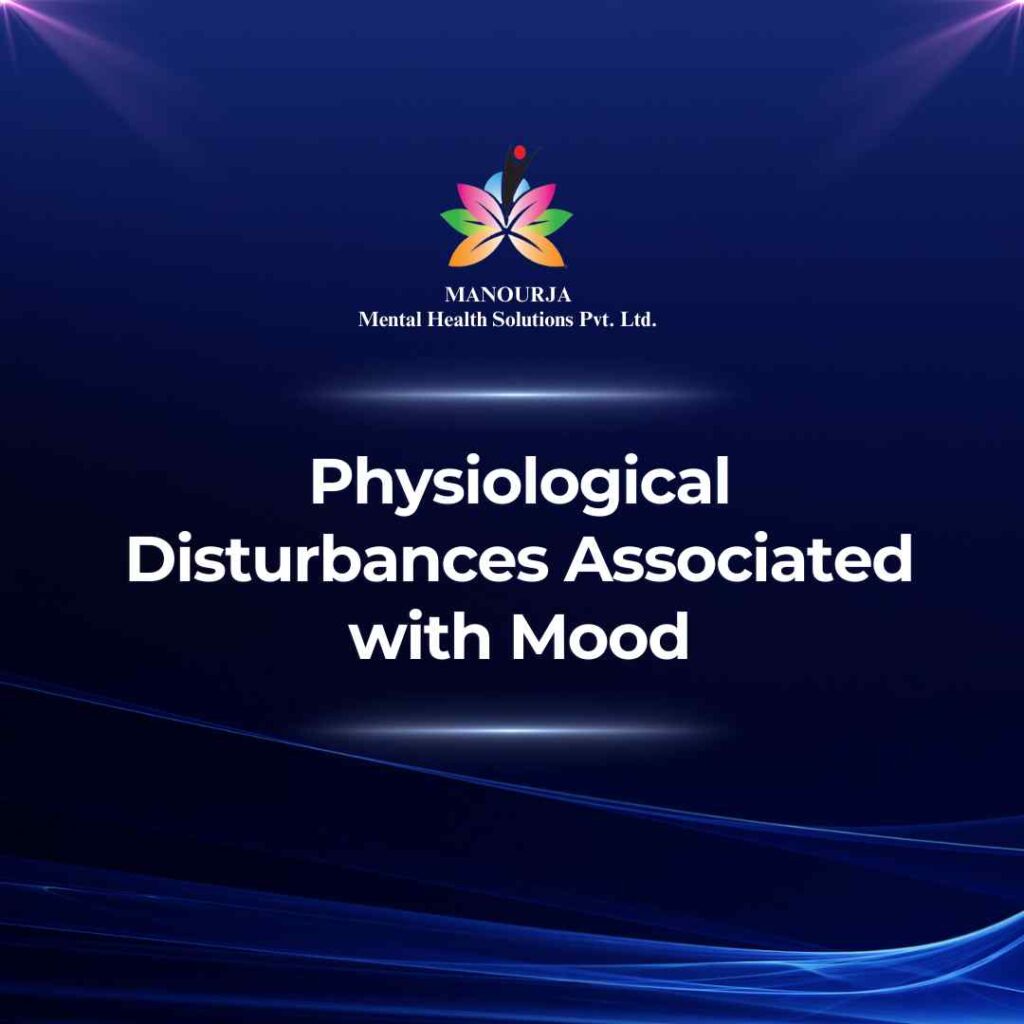Physiological Disturbances Associated with Mood

“Physiological disturbances associated with mood” refer to changes in bodily functions and processes that occur alongside fluctuations in emotional states. These disturbances can manifest as alterations in sleep patterns, appetite, energy levels, and overall physical well-being. They are often linked to mood disorders and can significantly impact an individual’s daily functioning and quality of life.
Physiological Disturbances Associated with Mood as a Sign and Symptom of Mental Illness
Physiological disturbances associated with mood are prominent features of mood disorders, reflecting the intimate connection between mental and physical health. These disturbances can vary widely depending on the specific mood disorder and may include disruptions in sleep, appetite, energy levels, and psychomotor activity.
Mental Illnesses with Physiological Disturbances Associated with Mood as Symptoms
Physiological disturbances associated with mood can occur in the following mental health disorders:
- Major Depressive Disorder (MDD): Individuals with MDD often experience significant physiological disturbances, including:
- Sleep Disturbances: Insomnia (difficulty falling asleep or staying asleep) or hypersomnia (excessive sleepiness).
- Appetite Changes: Loss of appetite or significant weight changes (either weight loss or weight gain).
- Fatigue and Low Energy: Persistent feelings of fatigue, lethargy, or lack of energy.
- Psychomotor Retardation or Agitation: Slowed movements and speech (psychomotor retardation) or restlessness and agitation (psychomotor agitation).
- Bipolar Disorder: In bipolar disorder, individuals may experience episodes of both depression and mania (or hypomania). Physiological disturbances associated with mood can vary depending on the phase of the disorder:
- During depressive episodes: Similar disturbances as in MDD (sleep changes, appetite changes, fatigue).
- During manic or hypomanic episodes: Decreased need for sleep, increased energy levels, heightened activity or agitation, and reduced appetite.
- Cyclothymic Disorder: This milder form of bipolar disorder involves chronic fluctuations in mood that are less severe than full-blown manic or depressive episodes. Physiological disturbances associated with mood can be less pronounced but may still include sleep and appetite changes.
- Seasonal Affective Disorder (SAD): SAD is characterized by recurrent depressive episodes that occur seasonally, typically during fall and winter when there is less sunlight. Physiological disturbances may include increased sleep (hypersomnia), carbohydrate cravings, and weight gain.
- Anxiety Disorders: While primarily characterized by excessive worry and anxiety, anxiety disorders can also involve physiological disturbances such as sleep disturbances (insomnia or restless sleep), changes in appetite, and heightened arousal or tension.
Managing and Treating Physiological Disturbances Associated with Mood
Treatment for physiological disturbances associated with mood focuses on addressing the underlying mood disorder and improving overall well-being:
- Medication: Antidepressants, mood stabilizers, and other psychiatric medications may be prescribed to stabilize mood, reduce symptoms, and improve physiological disturbances.
- Therapy: Cognitive-behavioral therapy (CBT), interpersonal therapy (IPT), and other psychotherapies can help individuals identify and change maladaptive thoughts and behaviors associated with mood disturbances.
- Lifestyle Changes: Implementing healthy lifestyle habits, such as regular exercise, balanced nutrition, sleep hygiene practices, and stress management techniques, can support mood stability and overall mental health.
- Supportive Interventions: Educating individuals and their families about mood disorders, providing social support, and promoting adherence to treatment can enhance outcomes and reduce the impact of physiological disturbances on daily life.
Recognizing and addressing physiological disturbances associated with mood as symptoms of underlying mental health conditions is crucial for effective diagnosis and treatment. Comprehensive and individualized approaches can help individuals manage symptoms, improve functioning, and achieve better overall quality of life.
At MANOURJA, we believe in the transformative power of counseling. Our experienced therapists offer a safe and supportive space where you can explore your thoughts, emotions, and challenges. Through personalized counselling sessions, we’ll work together to develop coping strategies, build resilience, and achieve lasting positive change. Discover the path to a healthier, happier you with MANOURJA counselling services.
MANOURJA Rehabilitation Services
At MANOURJA, we’re dedicated to helping you in rebuild your life, after difficult times. Our rehabilitation services focus on understanding what you need to move forward, whether you’re recovering from addiction, trauma, or any psychological – social challenges. We create personalized plans, that are all about helping you, regain your strength and find hope again. With a caring team by your side, you’ll have the support to make real progress and take steps toward a brighter, healthier future.
